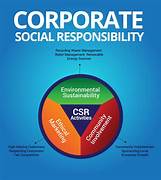Corporate Social Responsibility and Sustainability Outcomes
In recent years, corporate social responsibility (CSR) and sustainability have become more than just buzzwords—they are critical components of a company’s strategy and long-term success. Businesses are increasingly recognizing the importance of integrating social, environmental, and ethical considerations into their operations. This shift in focus is driven by growing consumer expectations, investor demands, and the need to address global challenges such as climate change, inequality, and resource depletion. The concept of CSR refers to a company’s commitment to conducting business in a way that benefits society and the environment, while sustainability emphasizes the ability to meet present needs without compromising the ability of future generations to meet their own. Together, these concepts drive the creation of positive social, environmental, and economic outcomes, not only benefiting businesses but also contributing to the greater good.
This article explores the link between corporate social responsibility, sustainability, and the tangible outcomes they create. It examines how CSR initiatives are reshaping businesses’ approaches to sustainability, the benefits and challenges of these efforts, and the long-term impact on communities, the environment, and the global economy.
Understanding Corporate Social Responsibility (CSR)
Corporate social responsibility (CSR) refers to a company’s voluntary commitment to operate in an ethical manner, taking into account the social, environmental, and economic impacts of its actions. While CSR can vary widely depending on the industry and company, its key principles often include:
- Ethical business practices: Ensuring fairness, transparency, and accountability in all business dealings.
- Environmental stewardship: Minimizing the environmental footprint of business operations, reducing waste, conserving energy, and promoting sustainable practices.
- Community engagement: Supporting local communities through philanthropic initiatives, volunteering, and social investments.
- Employee welfare: Promoting fair labor practices, diversity, equity, inclusion, and providing a safe and supportive work environment.
CSR initiatives often go beyond regulatory requirements, aiming to create long-term value for society, the environment, and the business itself. In recent years, consumers and investors have increasingly favored companies that demonstrate a genuine commitment to CSR, seeing them as more responsible and aligned with their values.
The Role of Sustainability in CSR
Sustainability, often considered the environmental pillar of CSR, focuses on the long-term preservation of natural resources and minimizing the negative impact of business activities on the planet. It incorporates economic, social, and environmental dimensions, and companies striving for sustainability aim to create value in a way that benefits both their bottom line and society as a whole.
Sustainability can be broken down into three main components:
- Environmental Sustainability: Ensuring that natural resources are used efficiently, reducing environmental impact, and promoting the conservation of ecosystems. Companies engage in practices like reducing carbon emissions, sourcing sustainable materials, adopting renewable energy sources, and improving waste management systems.
- Social Sustainability: Fostering positive relationships with employees, communities, customers, and other stakeholders by ensuring fair treatment, equal opportunities, and promoting social justice. Businesses engage in social sustainability by supporting local education, health initiatives, and diversity and inclusion programs.
- Economic Sustainability: Balancing profitability with long-term business viability, while considering the broader economic impact of business activities. Sustainable economic practices might include ethical sourcing, ensuring fair wages, and investing in the long-term financial health of the company and its stakeholders.
While CSR and sustainability are distinct concepts, they are interconnected, and a company’s ability to integrate both into its operations plays a vital role in achieving lasting success.
The Benefits of CSR and Sustainability Initiatives
- Enhanced Brand Reputation and Consumer Loyalty
In today’s highly competitive marketplace, consumers are increasingly making purchasing decisions based not just on price or quality, but also on a company’s ethical and sustainability practices. A 2020 survey by Nielsen revealed that 66% of global consumers are willing to pay more for sustainable products, with millennials and Generation Z showing the strongest preference for brands that prioritize sustainability.
Companies that integrate CSR into their operations and demonstrate a genuine commitment to sustainability are more likely to build stronger emotional connections with their customers, resulting in increased brand loyalty. For example, brands like Patagonia, Tesla, and Ben & Jerry’s have effectively used their CSR initiatives to strengthen customer trust, attract new audiences, and create a competitive advantage.
- Cost Savings and Operational Efficiency
While CSR initiatives often require initial investments, they can lead to significant cost savings in the long run. Sustainability-focused practices, such as energy conservation, waste reduction, and resource efficiency, can improve operational efficiency and lower production costs. For instance, companies that reduce energy consumption through green building initiatives or renewable energy adoption often experience substantial savings on utility bills.
Additionally, businesses that adopt circular economy principles—such as reusing materials or creating products with longer life cycles—can reduce waste disposal costs and create new revenue streams. Companies such as IKEA and Unilever have successfully implemented sustainable sourcing and waste reduction practices, which not only enhance their CSR reputation but also lower operational expenses.
- Attracting and Retaining Talent
As millennials and Generation Z enter the workforce, employees are increasingly prioritizing working for companies that align with their values. A strong CSR strategy that focuses on employee well-being, diversity, equity, and inclusion, as well as community engagement, can help businesses attract and retain top talent. Workers are more likely to feel proud of their employer if they see the company making a positive impact on society and the environment.
In fact, research from the Center for Creative Leadership found that 65% of employees would be willing to accept a lower salary to work for a company with strong CSR practices. A workforce that believes in the company’s mission and values is not only more engaged but also more productive.
- Risk Mitigation and Long-Term Resilience
CSR and sustainability initiatives can help companies identify and mitigate potential risks before they escalate into serious issues. By addressing environmental, social, and governance (ESG) factors, companies are better prepared to navigate regulatory changes, avoid fines, and maintain a positive reputation. For example, businesses that adhere to sustainability regulations and reduce their carbon footprint are less likely to be affected by future environmental laws or penalties related to carbon emissions.
Moreover, companies with robust CSR programs are often seen as more resilient in the face of economic or environmental crises. By diversifying their supply chains, investing in renewable energy, and addressing social issues, they are better positioned to adapt to changing market conditions and minimize the impact of unforeseen disruptions.
- Increased Investor Confidence
As environmental, social, and governance (ESG) criteria become more important to investors, companies that demonstrate a commitment to CSR and sustainability are attracting more capital. Impact investing—where investors seek to generate social or environmental benefits alongside financial returns—has grown exponentially in recent years. According to the Global Sustainable Investment Alliance, sustainable investing now represents over $30 trillion in assets globally.
Investors are increasingly using CSR and sustainability as a key factor in their decision-making process, preferring companies that prioritize long-term value creation over short-term profits. Publicly traded companies that actively integrate sustainability into their strategies and report on ESG performance often see better stock market performance and greater access to capital.
Challenges in Implementing CSR and Sustainability Initiatives
- Short-Term Financial Pressures
One of the key challenges businesses face when implementing CSR and sustainability initiatives is balancing long-term sustainability goals with short-term financial pressures. In many industries, there is a constant push to achieve immediate profits, and investing in sustainable practices or CSR programs can seem like a costly or unnecessary endeavor. Companies that prioritize short-term profits may hesitate to allocate resources to sustainability efforts, even though these investments may pay off in the long run.
- Measuring Impact
While the benefits of CSR and sustainability are clear, measuring their true impact can be difficult. Companies may struggle to quantify the positive effects of their initiatives, especially when it comes to social outcomes like improved community well-being or enhanced employee morale. Without clear metrics, it can be challenging to communicate the value of CSR programs to stakeholders, investors, and consumers.
To overcome this challenge, businesses must develop effective measurement frameworks that capture both quantitative and qualitative impacts, such as carbon emissions reductions, community engagement levels, and employee satisfaction.
- Supply Chain Complexity
Many companies face challenges in ensuring that their supply chains adhere to the same sustainability standards they set for themselves. For global businesses, ensuring that suppliers and partners follow ethical labor practices, minimize environmental impact, and engage in fair trade can be complex and resource-intensive. Managing supply chain sustainability requires comprehensive monitoring systems, strong supplier relationships, and continuous improvement efforts.
Conclusion
Corporate social responsibility and sustainability are no longer optional; they are essential for businesses that seek to thrive in the modern world. CSR initiatives help businesses address pressing global challenges such as climate change, social inequality, and resource depletion, while simultaneously creating long-term value for shareholders, employees, and consumers. The integration of sustainability into corporate strategies offers a multitude of benefits, including enhanced brand reputation, operational efficiency, talent attraction, and increased investor confidence. However, businesses must address the challenges of short-term financial pressures, measuring impact, and supply chain complexity in order to achieve lasting success.
Ultimately, the future of business lies in embracing the principles of CSR and sustainability to create a better world, one where companies contribute to society, the environment, and the global economy. As the demand for responsible business practices continues to grow, those companies that lead the way in CSR and sustainability will be well-positioned to succeed in a rapidly evolving marketplace.


